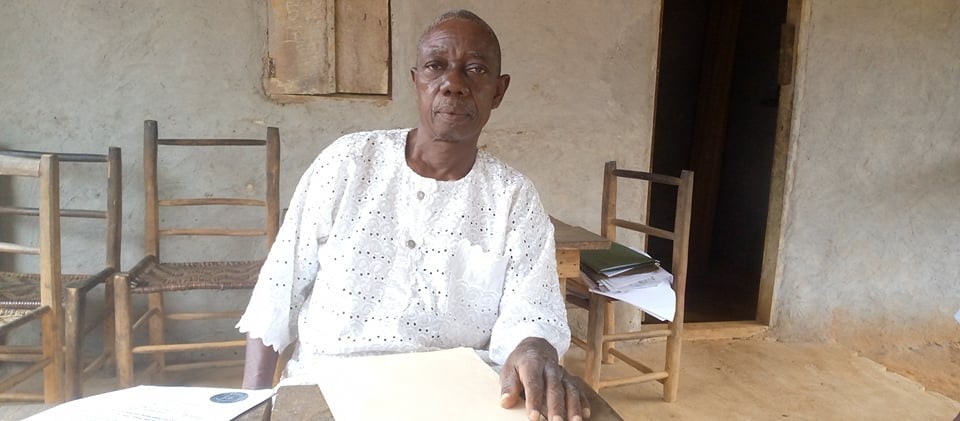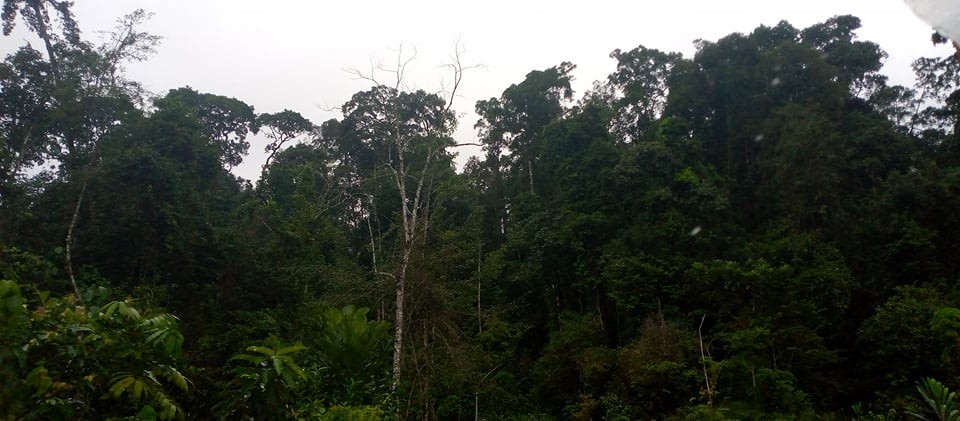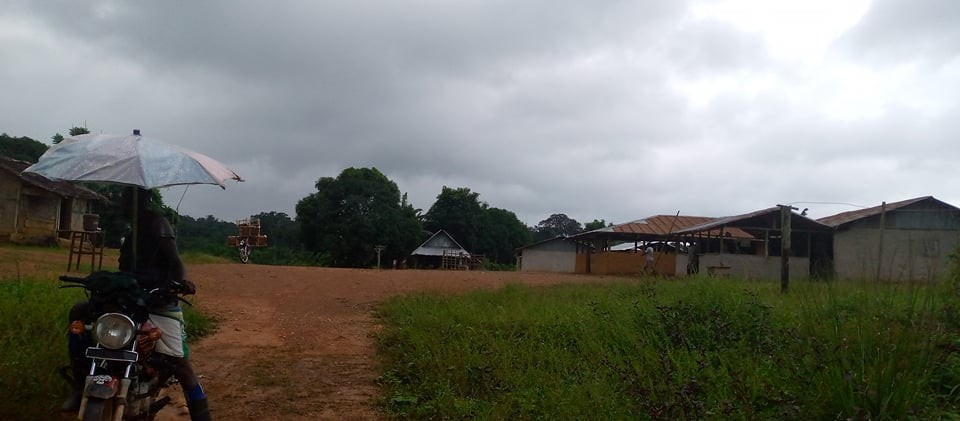Banner Image: Fineboy Village, the headquarters of Zuzohn Clan in Grand Bassa County. The DayLight/William Q. Harmon
BY William Q. Harmon
FINEBOY VILLAGE, Grand Bassa County— The roads, footpaths that lead to Fineboy Village are only passable by motorcycles. There are so many bumps and the road gets narrower as you go. Some people call this community a “graveyard” for childbearing women. Many women have died in labor, residents say.
“Our people are still drinking from creeks because we cannot afford hand pumps. There is no health facility for us here,” said James McGee, the youth leader of the community. “Our mothers and sisters often died in childbirth due to the long distance and terrible conditions of the road they walk to reach the only facility around here. Many of our children have never been to school. Their older siblings are no different.”
But these conditions that Zuzohn faces could have changed had Booming Green, a Chinese logging company lived up to an agreement it signed with the community.
In 2018, the company signed the 15-year agreement with Zuzohn promising to construct a school, erect a clinic and provide safe drinking water. It also promised to pave primary and secondary or a better road network coupled with other things. Three years since signing the concession for just over 12,000 hectares of the muggy forest, the company has failed to fulfill its part of the agreement.
“Booming Green has failed to provide our benefits and our people are getting frustrated, Piyigar Gaybeon, the chief officer of Zuzohn Community Forest Management Body says in an interview with The DayLight. “Our people are in need of basic social services. We live so close to both Monrovia and Buchanan, yet we are so far away from modern-day life.”

Gaybeon feels the hope of his people has been dashed, “and this is more painful for us because we thought the company would have helped solve most of the problem we have as a community.”
The agreement the community penned with the Chinese company came on the back of a rigorous process it completed getting a community forest management agreement (CFMA) as required by the Community Rights Law of 2009. They had to pay US$250 to the FDA to survey their land, map it, and did other things as required by the law before getting a certificate that gives them a legitimate claim to their ancestral land.
The company made other promises it has not fulfilled. Some of these include jobs opportunities for locals, especially women, and the provision of US$2,500 as an annual contribution to scholarships for eligible students from the forest community, which is a combination of two traditional clans, Zuzohn and Blallah. The former has 14 towns and several villages, while the latter—the remotest—has an estimated 11 towns and villages. It sits in the midst of dense and humid forestland with valuable timber species.
“The company only worked here for two months after the agreement was signed in 2018. They have not returned since,” Gaybeon said. It has only paid the community US$10,000 as land rental fees for 2019 and built a solitary hand pump.

Gaybeon and other townspeople fear Booming Green has no intention of returning to Zuzohn. They allege it is negotiating with an unnamed company to take over the forest.
Booming Green could not be reached for comment despite series of efforts this reporter made. Jerry Wang, the company’s general manager, could not be reached by phone for more than a week. Wang did not also reply to email and text messages sent to him.
Its failure to honor its obligations with Zuzohn does not only breach the MoU with the community. The MoU spells out specific timeline for the implementation of community projects, payments of land rental and harvesting fees, almost all of which has elapsed. For instance, by December 2019, the company was to construct five hand pumps in selected towns and villages, while by December last year, the company should have erected a six-classroom school. A clinic is to also be completed this December. These projects should have provided jobs for locals from towns and villages affected by its operations.
It violates the Community Rights Law (CRL) of 2009 with Respect to Forest Lands, a part of a postwar overhaul the country’s forestry sector. It violates the Voluntary Partnership Agreement (VPA) Liberia signed with the European Union (EU) in 2009, promising to share forest benefits with locals and allow them participate in the governance their forests.
The Forestry Development Authority (FDA) did not honor The DayLight’s request for interview on the matter. Gertrude Nyaley, the technical manager of FDA’s community forest department referred this reporter to Jerry Yomah, its technical manager. Yonmah said he could not speak on the issue as he was not the authorized spokesperson to do so. He referred me back to Nyaley.
“My office does not monitor whether companies are living up to the social agreements they signed with communities,” Nyaley said. “That is the job of the technical department.”
Jonathan Yiah, a lead campaigner with Sustainable Development Institute (SDI) blames the FDA for the situation in Zuzohn. He said it was allowing companies that owe the government and communities in forestry revenue and fees to acquire new logging contracts. Booming Green also has a concession with Garwin Community Forest nearby.
“We are taking this concern to the stakeholders,” Yiah tells The DayLight in a mobile phone interview. We strongly believe that the FDA must conduct a much stronger due diligence that will ensure that the company is credible and has the capacity to operate a particular concession.”
Back in Zuzohn, residents here remain disappointed.
“We want the government to prevail on this company to do what it has promised. They have been holding onto our forest since 2018 and we are not benefiting anything from them,” says Emma David, 36. “We need our benefit and they must provide it. The government must ensure that Booming Green pays.”





Facebook Comments